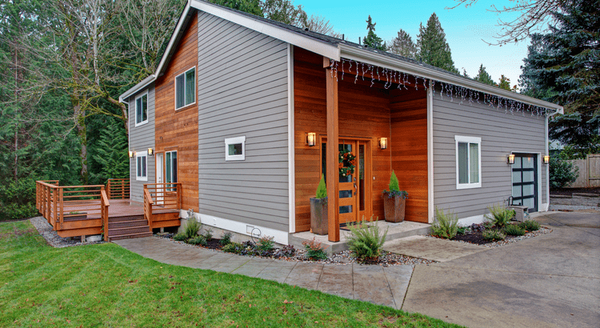

Why is this not a housing crisis
Three Reasons Why This Is Not a Housing Crisis In times of uncertainty, one of the best things we can do to ease our fears is to educate ourselves with research, facts, and data. Digging into past experiences by reviewing historical trends and understanding the peaks and valleys of what’s come before us is one of the many ways we can confidently evaluate any situation. With concerns of a global recession on everyone’s minds today, it’s important to take an objective look at what has transpired over the years and how the housing market has successfully weathered these storms. 1. The Market Today Is Vastly Different from 2008 We all remember the year 2008. This is not 2008. Today’s market conditions are far from the time when housing was a key factor that triggered a recession. From easy-to-access mortgages to skyrocketing home price appreciation, a surplus of inventory, excessive equity-tapping, and more – we’re not where we were 12 years ago. None of those factors are in play today. Rest assured, housing is not a catalyst that could spiral us back to that time or place. According to Danielle Hale, Chief Economist at Realtor.com, if there is a recession: “It will be different than the Great Recession. Things unraveled pretty quickly, and then the recovery was pretty slow. I would expect this to be milder. There’s no dysfunction in the banking system, we don’t have many households who are overleveraged with their mortgage payments and are potentially in trouble.” In addition, the Goldman Sachs GDP Forecast released this week indicates that although there is no growth anticipated immediately, gains are forecasted heading into the second half of this year and getting even stronger in early 2021. Both of these expert sources indicate this is a momentary event in time, not a collapse of the financial industry. It is a drop that will rebound quickly, a stark difference to the crash of 2008 that failed to get back to a sense of normal for almost four years. Although it poses plenty of near-term financial challenges, a potential recession this year is not a repeat of the long-term housing market crash we remember all too well. 2. A Recession Does Not Equal a Housing Crisis Next, take a look at the past five recessions in U.S. history. Home values actually appreciated in three of them. It is true that they sank by almost 20% during the last recession, but as we’ve identified above, 2008 presented different circumstances. In the four previous recessions, home values depreciated only once (by less than 2%). In the other three, residential real estate values increased by 3.5%, 6.1%, and 6.6% (see below): 3. We Can Be Confident About What We Know Concerns about the global impact COVID-19 will have on the economy are real. And they’re scary, as the health and wellness of our friends, families, and loved ones are high on everyone’s emotional radar. According to Bloomberg, “Several economists made clear that the extent of the economic wreckage will depend on factors such as how long the virus lasts, whether governments will loosen fiscal policy enough and can markets avoid freezing up.” That said, we can be confident that, while we don’t know the exact impact the virus will have on the housing market, we do know that housing isn’t the driver. The reasons we move – marriage, children, job changes, retirement, etc. – are steadfast parts of life. As noted in a recent piece in the New York Times, “Everyone needs someplace to live.” That won’t change. Bottom Line Concerns about a recession are real, but housing isn’t the driver. If you have questions about what it means for your family’s home buying or selling plans, let’s connect to discuss your needs.
Read More

A Realtor is your asset when ready to buy
A Realtor is your asset when ready to buy In the spring, many excited buyers get ready to enter the housing market. A Realtor is your asset when you’re ready to buy. Others continue dreaming about the homes they’d like to buy. The truth is, many potential buyers continue to dream longer than they need to, simply because they’re confused about the homebuying process. Thankfully, working with a trusted real estate professional can help ease those concerns and make the process to homeownership much easier to understand. Confidence of buyers A recent survey conducted by Ipson and Freddie Mac reveals the confidence level of Gen Z and Millennial buyers regarding the homebuying process. The graph below shows the breakdown of the top results, clearly indicating there’s a significant portion of younger buyers who are not yet confident with some of the steps in the homebuying process. Remember, a Realtor is your asset when you’re ready to buy. Between the homebuying process and the mortgage process, there are 230 possible steps in the transaction. With trusted professionals on your side, you certainly don’t have to know them all to have a successful experience. There are many reasons why these steps can change as you move through each one. Depending on your personal circumstances, the term or your mortgage, and the type of loan you use, the path you take may need to vary. That’s why guidance and support from the experts are key to understand the home buying steps. A Realtor is your asset when you’re ready to buy. Loan types for you In addition to the process itself, respondents in the survey definitely expressed concerns about understanding the types of loans available. Here are just a few of the basic loans to consider. Be sure to speak with your lender about the specifics of what will work best for you: FHA: Loans guaranteed by the Federal Housing Administration for first-time buyers. They generally enable qualified borrowers to enter the housing market with a lower down payment. Conventional: Loans that usually require a larger down payment. Repeat buyers usually use these types of loans since they have an established credit history as well as more money from the sale of their previous home (called equity) for a bigger down payment. VA: Loans available for Veterans of the U.S. Armed Forces and their spouses. They are guaranteed by the Department of Veteran Affairs. USDA: Loans for those living in rural and suburban areas. A qualified lender can issue a USDA home loan, and they are guaranteed by the United States Department of Agriculture (USDA). Interest rates also popped up as a common area of confusion among Gen Z and Millennial respondents in the survey. With today’s rates hovering at near historic lows, it’s a fantastic time for buyers to get more house for their money in the current market. Why? When mortgage rates are this low and wages are increasing as they are today, overall affordability increases, enabling home buyers to stretch their mortgage dollars further. It’s just another area where a trusted professional can help simplify the process and give guidance along the way. There are many possible steps in a real estate transaction, but they don’t have to be confusing. To understand your best course of action, let’s get together today to ensure you feel confident and informed at every turn. I want to be your Realtor and asset to make the purchase simple.
Read More

Renting in the Austin Area: Is Now the Time to Buy?
Buying vs. Renting in the Austin Area Those who have been renting in the Austin area have experienced skyrocketing rental prices for as long as we can remember. This has caused many renters to face a tremendous burden when juggling their housing expenses and the desire to save for a down payment at the same time. The recent stabilization of rental prices provides a great opportunity for renters to save more of their current income to put toward the purchase of a home. Let’s look at Buying vs. Renting in the Austin area! Just last week the Joint Center of Housing Studies of Harvard University released the America’s Rental Housing 2020 Report. The results explain the financial challenges renters are experiencing today while they debate Buying vs. Renting in the Austin area. “Despite slowing demand and the continued strength of new construction, rental markets in the U.S. remain extremely tight. Vacancy rates are at decades-long lows, pushing up rents far faster than incomes. Both the number and share of cost-burdened renters are again on the rise, especially among middle-income households.” According to the most recent Zillow Rent Index, which measures the estimated market-rate rent for all homes and apartments, tenants who are renting in the Austin area are paying an average of $1,600 per month. Here is a graph of how the index’s median rent values have climbed over the last eight years: Is Good News Coming? There seems, however, to be some good news on the horizon for those renting in the Austin area. Four of the major rent indices are all reporting that rents are finally beginning to stabilize in all rental categories: 1. The Zillow Rent Index, linked above, only rose 2.6% over the last year. 2. RENTCafé’s research team also analyzes rent data across the 260 largest cities in the United States. The data on average rents comes directly from competitively rented, large-scale, multi-family properties (50+ units in size). Their 2019 Year-End Rent Report shows only a 3% increase in rents from last year, the slowest annual rise over the past 17 months. 3. The CoreLogic Single Family Rent Index reports on single-family only rental listing data in the Multiple Listing Service. Their latest index shows how overall year-over-year rent price increases have slowed since February 2016, when they peaked at 4.2%. They have stabilized around 3% since early 2019. 4. The Apartment List National Rent Report uses median rent statistics for recent movers taken from the Census Bureau American Community Survey. The 2020 report reveals that the year-over-year growth rate of 1.6% matches the rate at this time last year; it is just ahead of the 1.5% rate from January 2016. They also explain how “the past five years also saw stretches of notably faster rent growth. Year-over-year rent growth stood at 2.6% in January 2018, and in January 2016 it was 3.3%, more than double the current rate.” At the same time, average wages are increasing. If you are renting in the Austin area and dream of buying a home of your own, I would love to help!
Read More

How to price your home to sell?
How to price your home to sell? Even though there’s a big buyer demand for homes in today’s low inventory market, it doesn’t mean you should price your home as high as the sky when you’re ready to sell. Here’s why making sure you price it right is key to driving the best price for the sale. Have you often wanted to know how to price your home to sell? What is your price? If you’ve ever watched the show “The Price Is Right,” you know the only way to win the game is to be the one to correctly guess the price of the item up for bid without going over. That means your guess must be just slightly under the retail price. When it comes to pricing your home, setting it at or slightly below market value will increase the visibility of your listing and drive more buyers your way. This strategy actually increases the number of buyers who will see your home in their search process. Why? When potential buyers look at your listing and see a great price for a fantastic home, they’re probably going to want to take a closer look. This means more buyers are going to be excited about your house and more apt to make an offer. When this happens, you’re more likely to set up a scenario with multiple offers, potential bidding wars, and the ability to drive a higher final sale price. At the end of the day, even when inventory is tight, pricing it right – or pricing it to sell immediately – makes a big difference. Here’s the other thing: homeowners who make the mistake of overpricing their homes will eventually have to lower the prices anyway after they sit on the market for an extended period of time. This leaves buyers wondering if the price drops were caused by something wrong with these homes when in reality, nothing was wrong, the initial prices were just too high. If you’re thinking about selling your home this year, let’s get together and give you a professional on your side to help you properly price your home and maximize demand from the start. You can search for homes on my site at beamerhomegroup.com
Read More
Categories
- All Blogs (109)
- Brohn Homes (1)
- Buy a Home (19)
- CMG Mortgage (8)
- Drees Homes (1)
- Economic Impact (9)
- Fairway Mortgage (8)
- Finding a rental home (1)
- Forebearance (3)
- Foreclosures (1)
- Home Buyer (33)
- Home Loan (15)
- Home Seller (21)
- Homes in Austin Texas (19)
- Homes in Georgetown (18)
- homes in Hutto tx (13)
- Homes in Round Rock (18)
- housing market 2023 (2)
- housing market 2024 (4)
- housing market predictions (4)
- How to sell my home (9)
- Luxury Rentals (4)
- Mortgage (13)
- MottoMortgageHometown (1)
- Moving to Austin (23)
- Presidential Election 2024 (1)
- Real Estate (40)
- Realtor (37)
- Renter tips (4)
- renters (8)
- Renting (11)
- Rocket Mortgage (6)
- Seller Tips (6)
- sellers (14)
- Should I sell my home (5)
- ThriveMortgage (1)
- VA Home Buyer (1)
- Why my home does not sell (3)
Recent Posts










